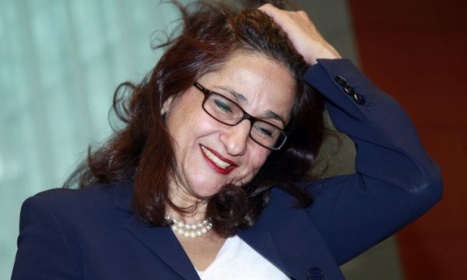Qui a dit qu’il ne se passe rien l’été au gouvernement? Le 31 juillet, en plein ramadan, le cap de la politique économique marocaine a enfin été fixé de manière indiscutable par Nemat Shafik:
“The arrangement under the Fund’s Precautionary and Liquidity Line (PLL), which the authorities intend to continue to treat as precautionary, has provided Morocco with an insurance against external risks while supporting the authorities’ economic strategy.
“Following the deterioration in the fiscal and external accounts in 2012, the authorities have taken significant measures to reduce vulnerabilities, despite an unfavorable external environment and a challenging regional context. Continuing efforts to build consensus and move ahead with difficult but necessary reforms will be key for preserving macroeconomic stability while promoting higher and more inclusive growth.
“The authorities’ fiscal deficit target for 2013 of 5.5 percent of GDP remains consistent with their medium-term objective built on maintaining fiscal sustainability and supporting external adjustment. Close monitoring and firm control of spending will be needed through the rest of the year to ensure that this target is met. The planned tax reform should promote more equity and support competitiveness while generating adequate resources. Continued efforts to contain the wage and subsidy bills are important for creating space for better targeted social spending and higher capital expenditure. Recent actions to reduce subsidies are welcome in that regard, while moving ahead with a comprehensive subsidy reform will be crucial to further reducing fiscal and external vulnerabilities. Furthermore, the early adoption of a new organic budget law will be important to ensure a strong, transparent and modern fiscal framework.
“Lower global commodity prices, rising exports in newly developed sectors and lower food imports have helped reduce the current account deficit, and, combined with strong capital inflows, stabilize reserves. Structural reforms to enhance competitiveness continue to be a priority to sustain these gains. Moving toward greater exchange rate flexibility supported by appropriate macroeconomic and structural policies would enhance external competitiveness and the economy’s ability to absorb shocks.”
Pourquoi l’anglais et qui est cette Nemat Shafik? Simple: l’anglais est l’unique langue de travail du FMI, dont Mme Shafik est le président faisant fonction et le directeur exécutif adjoint. Voici les éléments majeurs de son programme électoral, qu’elle se fera forte de défendre face aux électeurs marocains, de Tanger à Lagouira:
- Un contrôle ferme des dépenses publiques;
- Une réforme fiscale pour plus d’équité et de compétitivité mais aussi plus de rentrées fiscales;
- Une modération salariale accrue;
- Une baisse de la facture de la compensation des produits dits de première nécessité par une réforme globale, laquelle est cruciale;
- Des dépenses sociales plus ciblées;
- Enfin, l’adoption rapide de la loi organique sur la loi de finances, telle que prévue à l’article 75 de la Constitution.

– So, Ms Shafik; what do you have to say to the average Moroccan voter…
– Let me interrupt you right here, dear: we don’t do elections at the IMF.
Petite déception tout de même: aucune mention de la réforme du droit de grâce, de sa vision sur la plan d’autonomie du Sahara marocain, du racisme contre les sub-Sahariens au Maroc, ni sur une éventuelle élection législative anticipée.
Ah, on me murmure dans l’oreillette qu’elle n’est pas candidate aux prochaines élections marocaines. Pas grave: notre chef de l’Etat et ses conseillers économiques non plus!
Filed under: bolitique, Plubopaysdumonde | Tagged: économie marocaine, consensus de Washington, FMI, fonds monétaire international, nemat shafik, souveraineté nationale | 1 Comment »


